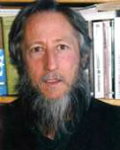Brett, John
Dec 8, 2020
JOHN BRETT, PHD
Associate Professor
School of Anthropology
Fulbright Scholar
La Paz, Bolivia 2007-2008
THE DYNAMICS OF MICROFINANCE PARTICIPATION IN EL ALTO, BOLIVIA
Only a handful of studies exist that deeply investigate the reality of microfinance in women’s lives. Not many studies have been conducted in Bolivia, even though the country has one of the most mature microfinance industries in the Western hemisphere. John Brett, associate professor in Anthropology, developed in-depth research using a mixed-method study on the economic and social outcomes for participants of CRECER’s microfinance program. Brett’s study resulted in a more thorough understanding of how the use of credit impacts the lives of microfinance clients. It helped CRECER create, refine and change its existing evaluation procedures and programs to meet emerging needs.
Brett’s study evolved into a long-term collaboration among the University of Colorado Denver, Freedom from Hunger (FFH), a U.S. nongovernmental organization, and CRECER, a Bolivian microfinance organization. The Fulbright project was eight month long, but through the collaboration, the scope of the project extended to 18 months. The final data collection period will take place in June, 2009 providing one of the most comprehensive data sets on women’s participatory experience in microfinance and the impact on household well-being, health and food security.
The academic articles from this study and several technical reports based on the findings were to be made available to Freedom from Hunger and CRECER in Spanish and English. The purpose of the information was to guide the organizations by providing an understanding of the program levels and goals to better meet the needs of their clients. During 2009-2010 Academic Year, Brett began writing a book based on the collected data.
While in Bolivia, Brett facilitated the MA thesis for Kate Oviatt, a Department of Anthropology student.
Brett initiated a new collaboration with three CU Denver colleagues from the Geography, Family Medicine, and Health and Behavioral Sciences departments in conjunction with NGOs in Bolivia. The new project focused on people’s perceptions of risk to natural hazards.